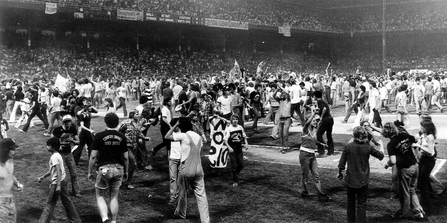
Disco Demolition Night
Disco Demolition Night was a Major League Baseball (MLB) promotion on Thursday, July 12, 1979, at Comiskey Park in Chicago, Illinois, that ended in a riot. At the climax of the event, a crate filled with disco records was blown up on the field between games of the twi-night doubleheader between the Chicago White Sox and the Detroit Tigers. Many had come to see the explosion rather than the games and rushed onto the field after the detonation. The playing field was so damaged by the explosion and by the rioters that the White Sox were required to forfeit the second game to the Tigers.
Date
July 12, 1979
6:00 pm CDT and following
Comiskey Park, Chicago, Illinois, U.S.
Steve Dahl, Mike Veeck, and several thousand attendees
Game 2 of Tigers/White Sox doubleheader forfeited to Detroit
None
0–30
Damage to the playing field
Approximately 39
Disorderly conduct
July 12, 1979 (first game of a doubleheader)
Chicago, Illinois
- HP: Dave Phillips (crew chief)
- 1B: Dan Morrison
- 2B: Dallas Parks
- 3B: Durwood Merrill
47,495
WDIV: George Kell, Al Kaline and Mike Barry
WSNS-TV: Lorn Brown, Harry Caray and Jimmy Piersall
WJR: Ernie Harwell and Paul Carey
WMAQ: Brown, Caray and Piersall
In the late 1970s, dance-oriented disco was the most popular music genre in the United States, particularly after being featured in hit films such as Saturday Night Fever (1977). However, disco sparked a major backlash from rock music fans—an opposition prominent enough that the White Sox, seeking to fill seats at Comiskey Park during a lackluster season, engaged Chicago shock jock and anti-disco campaigner Steve Dahl for the promotion at the July 12 doubleheader. Dahl's sponsoring radio station was WLUP (97.9 FM, now WCKL), so admission was discounted to 98 cents for attendees who turned in a disco record; between games, Dahl was to destroy the collected vinyl in an explosion.
White Sox officials had hoped for a crowd of 20,000, about 5,000 more than usual. Instead, at least 50,000—including tens of thousands of Dahl's listeners—packed the stadium, and thousands more continued to sneak in after capacity was reached and gates were closed. Many of the records were not collected by staff and were thrown like flying discs from the stands. After Dahl blew up the collected records, thousands of fans stormed the field and remained there until dispersed by riot police.
The second game was initially postponed but was forfeited by the White Sox the next day by order of American League president Lee MacPhail. Disco Demolition Night preceded, and may have helped precipitate, the decline of disco in late 1979; some scholars and disco artists have debated whether the event was expressive of racism and homophobia. Disco Demolition Night remains well known as one of the most extreme promotions in MLB history.